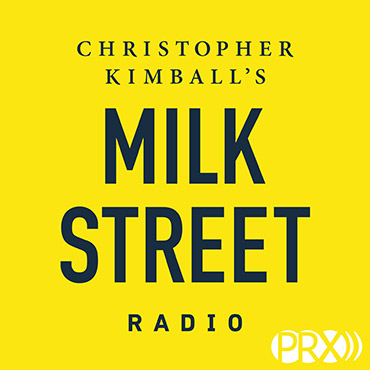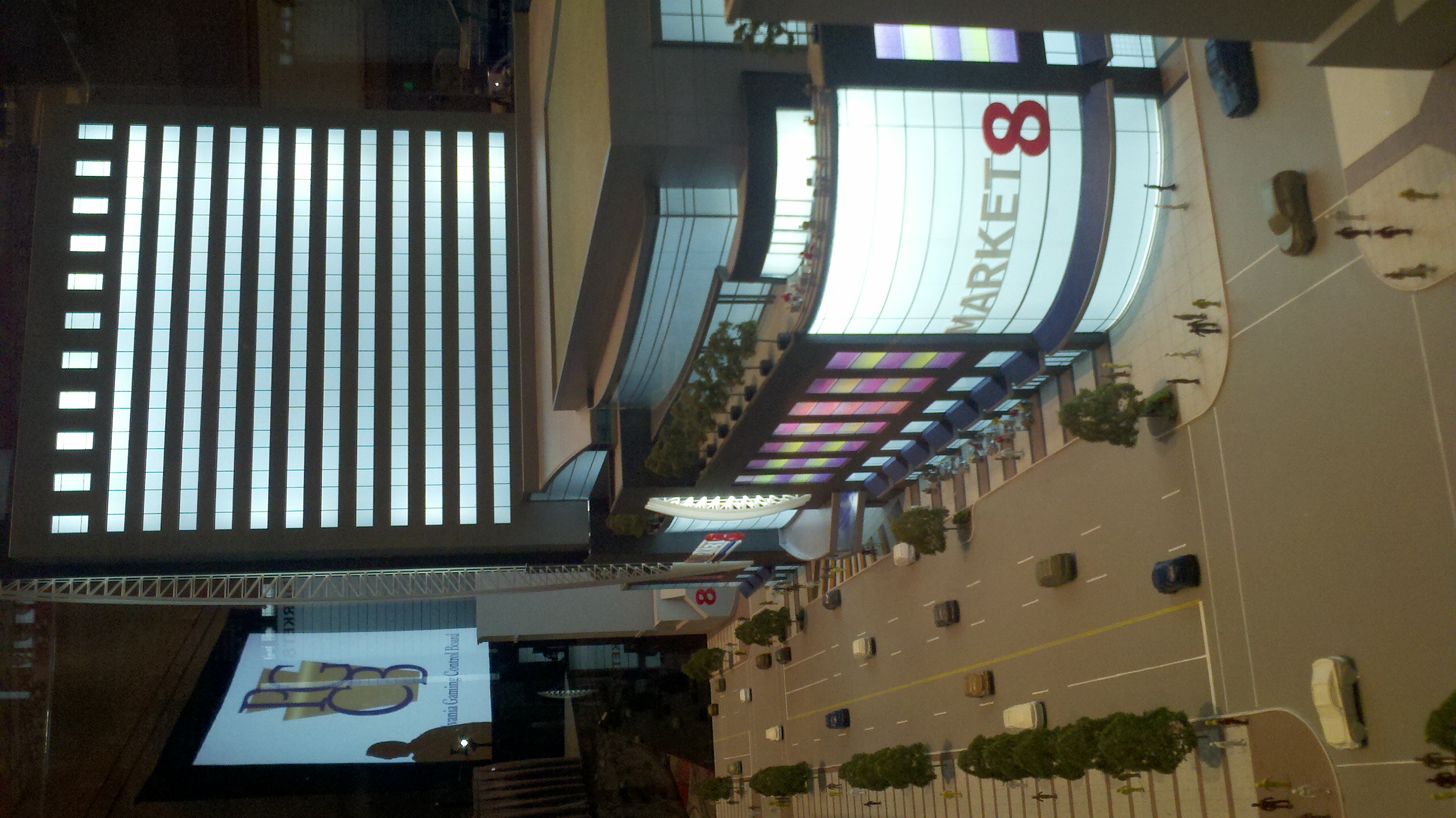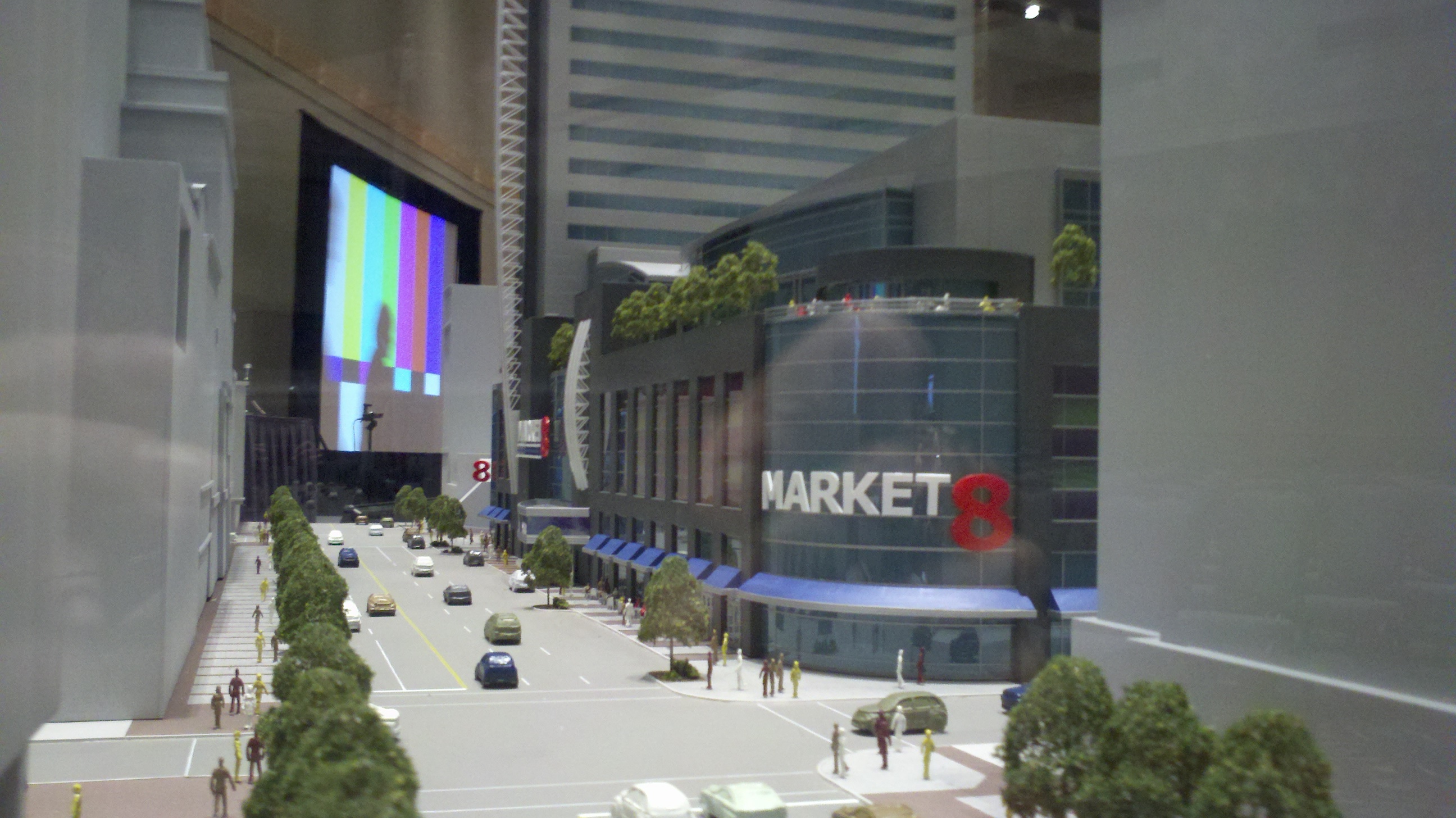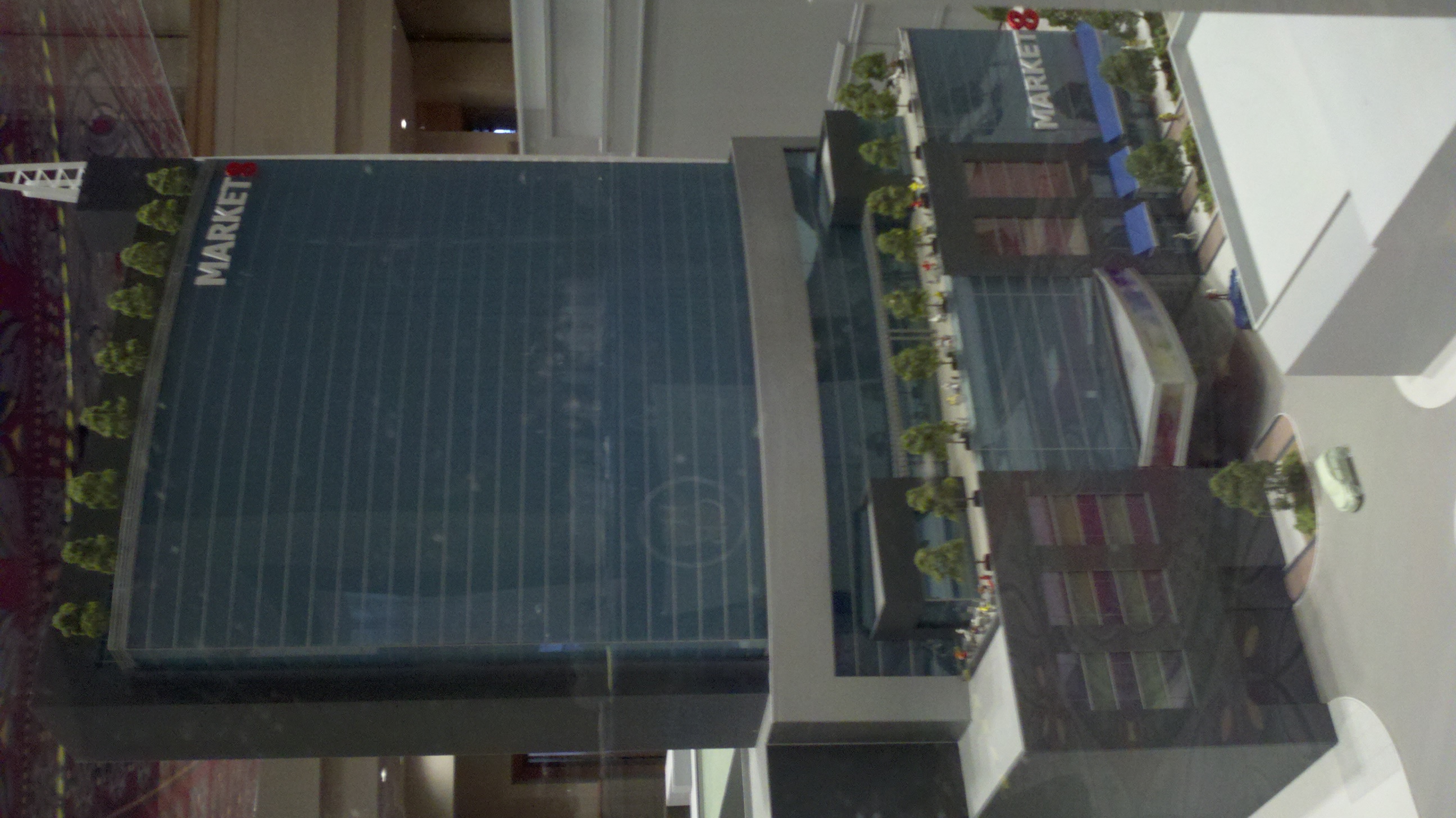Market8 to gaming board: We’d make the most money and transform Market Street
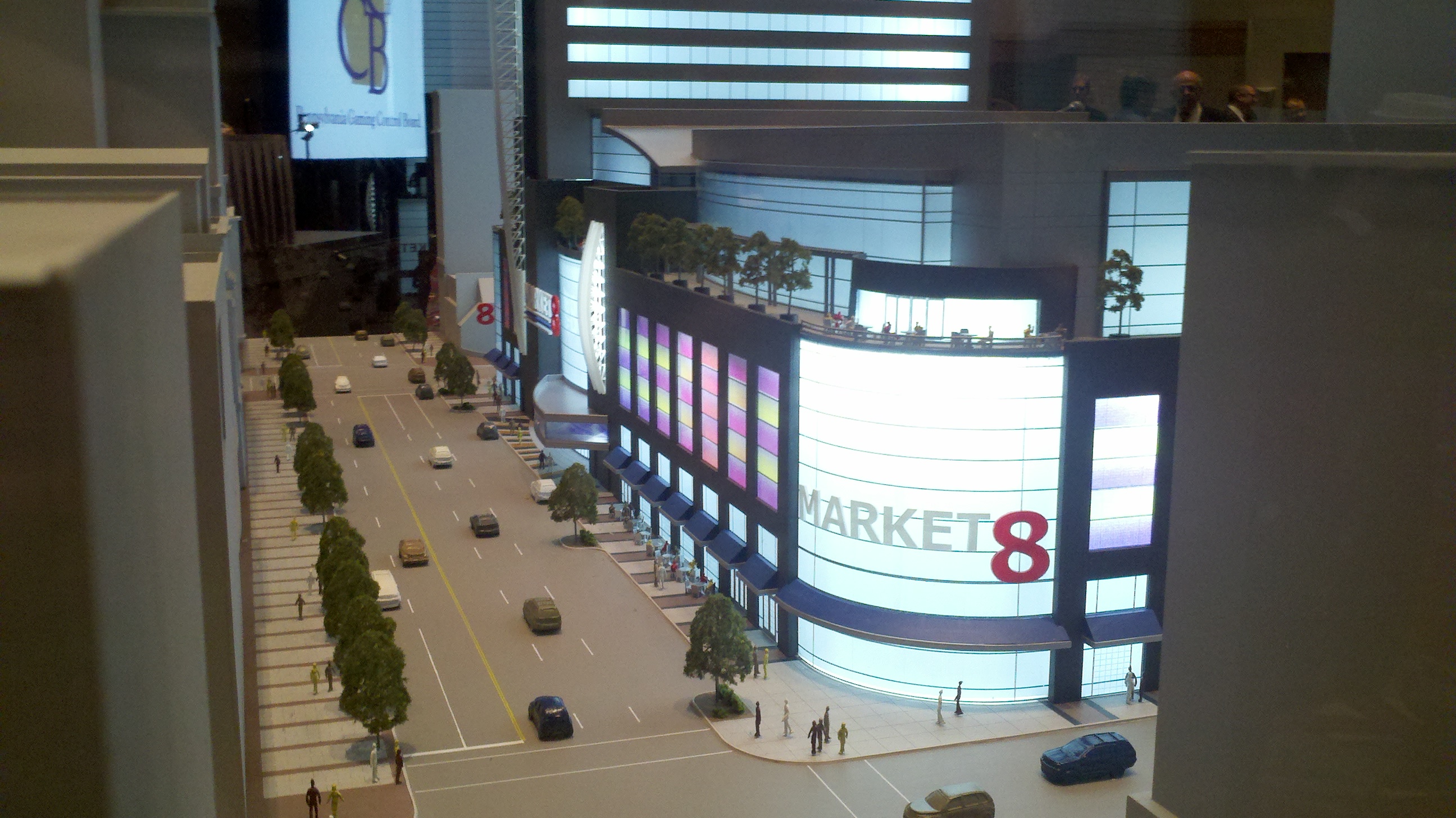
The Market8 team was first up on day two of the casino applicant suitability hearings before the Pennsylvania Gaming Control Board.
The Market8 team, which includes The Goldenberg Group and Mohegan Sun, proposes building the most vertical of the five proposals on a vacant lot at 8th and Market streets. The Market8 team believes their location is best because it is close to the Pennsylvania Convention Center and many of Philadelphia’s historic and cultural attractions, and also highly accessible by mass transit. See the hearing, and videos of all the suitability hearings, here.
Chairman William Ryan got the day started by announcing a change in the next day’s schedule. The hearing for the Live! Hotel & Casino will be delayed until 9:30 a.m., so that Bart Blatstein’s Tower Entertainment may respond to Tuesday’s testimony by a group of interveners, Rodeph Shalom Synagogue; the Mathematics, Civics and Sciences Charter School and the Friends Select School. Tower’s attorneys objected to several parts of the testimony yesterday, but the board allowed the vast preponderance of it. At one point, Ryan told the attorney that the information presented “is not hurting you.”
When it comes to location, “the basic thesis is this: It’s in the middle of a concentrated strip of museums, cultural sites, offices and residential developments,” Ken Goldenberg told the gaming board as he opened the presentation. It’s the biggest confluence of highways, roadways, taxis, transit and pedestrians in the city and the commonwealth, he said. “what that means for attracting new gamers not going to pre-existing casinos, for gross gaming revenue, aggregate gross gaming revenue, is unparalleled.”
The Market8 team believes their project has the most potential to stimulate economic growth outside of itself, along the lagging East Market Street corridor. It credits a rewards program that would allow customers to spend their points at many participating restaurants, stores and cultural institutions. The Ross Group’s Bill Miller, an equity partner, told the board Market8 would also contribute a minimum of $2 million per year from opening day to the Market8 Improvement Zone. The money would be used to make physical improvements to East Market Street, security, lighting and greening. It would also provide development assistance to other entities, including micro loans.
Miller said the team’s committment to inclusion of minority and women businesses has earned the project the endorsement of several minority chamber of commerces.
Market8 is the closest proposal to Chinatown, a neighborhood where some have expressed special concern about gaming addiction. Through the Goldenberg Group’s charitable arm, Market8 said it will take steps to help problem gamblers, including finding Mandarin and other Asian-language speakers to provide counseling services for non-English speakers. Services would be housed within the casino if Market8 gets the license, but Miller said the People Helping People Philadelphia charity will provide the help regardless of which casino project the state choses.
The project calls for 2,400 slot machines, 82 table games, 30 poker tables and a VIP lounge. Amenities would include eight restaurants, a lounge, a concert and banquet hall managed by AEG Live and a hotel paid-for, owned and managed by Hersha Hospitality. The casino would open while work on the hotel was still being done. It would take another six months to complete the hotel
Mitchel Etess, project partner from Mohegan Sun, touted Mohegan’s experience. He said its Connecticut casino is the “highest grossing casino in the Western Hemisphere.” Mohegan’s Pocono Downs facility has also done well, he noted, and its Resorts casino in Atlantic City, which Mohegan recently revamped, is”outperforming the market” there, he said.
Mohegan Sun has a database of 5 million customers in the Northeast alone, he said.
Entertainment would be managed by AEG Live, which runs the Staples Center in LA, and several local facilities, including The Mann and Keswick Theater.
Hersha, which owns the Rittenhouse Hotel, would market the Market8 hotel under Marriott’s Autograph brand.
JCJ Architecture has designed 35 casino projects, and has designed Market8 to “rise upward instead of extending outword, and look outside instead of inside.”
Project consultant Peter Tyson of PKT Consulting, said his study shows Market8 would gross $518 million in its first year of operation, projected to be 2016 if it gets the license. Tyson said the Provence would generate $458 million and a stadium-area casino $393 million.
He notes that $518 million is about the same revenue reported by Parx Casino.
Tyson said Market8 would also generate more incremental revenue – revenue that is not cannibalized from an existing casino – $86 million more than The Provence, he said, and $147 million more than a stadium area casino. The team estimates that 78 percent of revenue would come from an untapped market, and 22 percent from luring people who now go to another casino, mostly SugarHouse.
While other applicants and PGCB members have been focused on casino market saturation, Tyson told the board he doesn’t think the market is saturated yet. He estimates there’s $160 million of untapped demand in the market annually.
Etess said the partners would front $125 million in equity, and the balance, $375 million, would be borrowed. Deutschbank has committed to the loan, he said.
He elaborated on the relationship between the hotel and rest of the project. The project would be developed like a condominium, where Hersha would put forward the $70 million for the hotel and operate it, but some common amenties – elevators and such, would be shared.
Consultant Shuprotim Bhaumik of HR&A associates spoke to the team’s belief the project would spur economic development in the Market East corridor – a long-standing goal of the city.
He said there was approximately four million square feet of undeveloped and underdeveloped properties nearby, “What they need is a catalyst, and that catalyst can be Market8.”
Goldenberg closed the presentation 90 minutes after he opened it. Granting the license to Market8 would generate the most taxes for the state and city and transform “this avenue into one of the greatest avenues of America,” he said.
Commissioner Keith McCall opened the board’s Q-n-A with Market8 with a question on how city zoning might impact the construction schedule. Casino zoning requires 1,900 parking spaces, and the project has 1,000, he noted, and asked whether getting zoning relief could lengthen the 30-month construction timeline the team gave.
Team members said given the license, they would immediately start the zoning and permit process, and not wait for the anticipated appeals to end. They said permitting would take about nine months.
They also revealed their zoning relief strategy: They would ask the city to allow gaming within the CMX5, commercial mixed-use, zoning classification the property sits in, which would mean they have enough parking to meet the requirements. They said than the alternative, where the city would re-zone the Market8 parcel under the entertainment classification that allows casinos. Right now, this is the only class in which casinos can operate.
After the hearing, project attorney William Downey elaborated for PlanPhilly. He said the team is talking to the city, and would pursue whatever zoning relief route the city recommends. But he doubted that the city would want to use the casino zoning classification that is appropriate for the waterfront at the Market and 8th location. If they do, it makes sense to him and the zoning attorneys he’s working with that there would be a change in it, allowing for parking to be further away from the project than an adjacent site.
Downey said his zoning colleagues say it would be simpler to allow for a casino within CMX5. When asked if the request would be to allow the usually prohibited use on this one site only or change the entire CMX5 class to allow gaming, Downey said it really didn’t matter to the Market8 team, but he assumed the city wouldn’t want to change CMX5 across the board. Critics would likely say that if the state expanded the gaming landscape, the city would be left with many possible locations, from a zoning standpoint, he said.
Commisisoner John McNally asked what would crop up in the under-developed lots around Market8, and what is there now.
Bhaumik said open space, parking lots and one-story retail could become different types of commercial, office, retail, hotel and residential space, up to 15 stories or so high under current zoning.
The team told McNally that their traffic and parking studies are based on the addition of the casino only, not any potential further development.
Commissioner David Woods asked what percentage of revenue would come from gaming, and what percentage would come from other sources. Etess said for Market8, the “vast majority” would come from gaming, since the restaurants, entertainment venues, hotel and other amenities would be leased to other operators. Facility wide – which is what Woods was interested in – Etess said 70 percent of revenue would come from gaming and 30 percent non-gaming.
Commissioner Greg Fajt expressed skeptism about revenue projections and parking.
He asked Tyson what his projected win per day per slot machine is, and was told $382 per day. (Note for the unfamiliar: Win per day isn’t what patrons win, but the amount the casino keeps after paying out customer winnings.) Fajt noted the average slot machine daily win across the state is $265. “You’re anticipating that out of the gate, you have a 30 percent increase over what the average is right now. We have a very mature market in Pennsylvania, and the folks at Mohegan Sun know better than anybody it takes awhile to reamp up. I have a healthy skeptacism about your number.”
Tyson called the number “a healthy win per unit,” but said he was confident in it. He noted that none of the existing casinos are in urban areas, and that makes a difference.
Regarding parking, Fajt had concerns about the team’s plan to charge for parking. He sees it as a barrier to enticing people from the suburbs, and said that Valley Forge and Nemacolin were having problems with it. “Gamblers don’t like to have to pay to get into a casino,” he said.
Bobby Soper of Mohegan Sun said he agreed paying could be a barrier, but, “Any gamer we want there will not be charged for parking.” He continued: “Twenty percent of our customers drive 80 percent of our revenue. I can tell you now, those 20 percent are not paying for parking.”
Gaming board chairman William Ryan asked, “What’s the most significant difference between you and The Provence?”
Goldenberg spoke of location, which he called the most concentrated corridor of the convention center, historic sites, retail and restaurants in the city or state.
The Provence, he said, “is more in the middle of schools, churches, synagogues and administrative buildings,” and a place that’s suited for more residential development and educational and religious institutions, and retail that complements such uses.
PennDOT’s Francis Hanney said the location within the central business does up the chance for non-vehicular trips. He backed up the applicant’s traffic study, saying mitigation efforts can eliminate the proposed-casino’s traffic impacts on most intersections. The exception: No improvement could mitigate the impact at 9th and Market,result in a decrease in service. The project’s anticipated traffic would reduce the service grade of the casino from A to B, but Hanney said that’s still an acceptible level.
Read what the team told PlanPhilly about their project here. See their Facebook page here.
WHYY is your source for fact-based, in-depth journalism and information. As a nonprofit organization, we rely on financial support from readers like you. Please give today.
